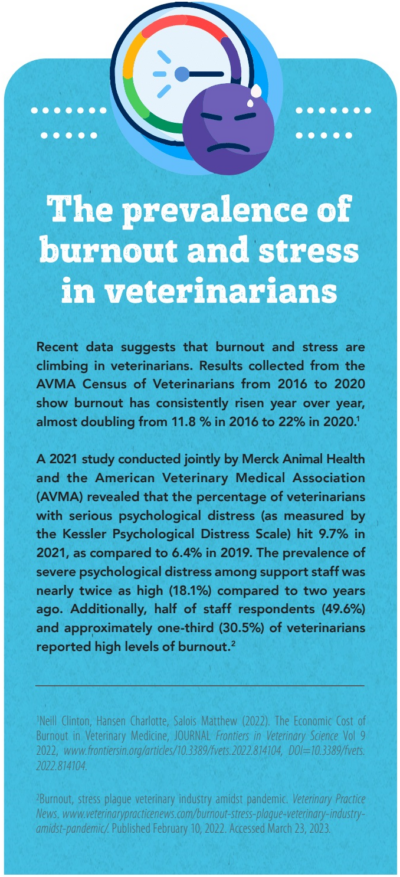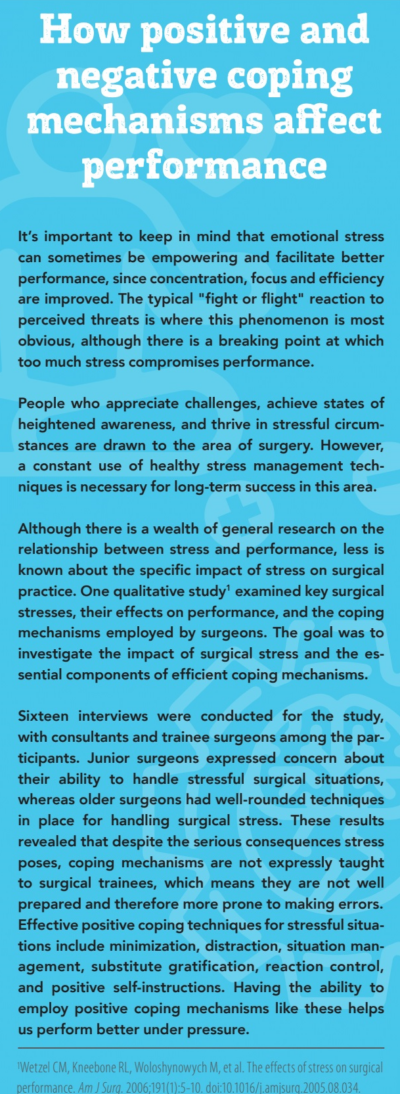Stress is a serious problem among veterinarians and their staff, and can lead to anxiety, depression, and other issues if not addressed. Recognizing the signs and using one or more of the calming techniques highlighted in this article will help you gain control of your stress before it becomes overwhelming.
As a busy veterinary practitioner, youre probably no stranger to stress, whether it arises from working long hours or dealing with upsetting situations. Knowing how to recognize stress and take steps to alleviate it is vital to your mental and emotional well-being.
RECOGNIZING THE SYMPTOMS
Once the body is in the stress response phase, hormones such as adrenaline and cortisol are released and the muscles tighten. Tension headaches, back pain, anxiety, indecisiveness, poor focus, and irritability are some of the symptoms that can ensue. Its not surprising, then, that a stressed state of mind not only reduces your efficiency, but also hampers your ability to deal with challenges.
We all experience stress in various ways. Its useful to be able to recognize the early indicators before things spiral out of hand. Common emotional stress indicators include:
- Tension
- Agitation or hostility
- Inability to unwind
- General lack of interest in life
- Non-existent sense of humor
- Inability to enjoy activities that would normally make you happy
- Feelings of isolation
Stress can also manifest physically in the following ways:
- Hyperventilating or shallow breathing
- Tense muscles
- Trouble sleeping
- Headaches
- Digestive problems such as diarrhea, vomiting, and constipation
- Sexual issues
- Grinding teeth or clenched jaw
- Weariness or lack of vigor
Lets look at seven techniques validated by psychologists to combat stress. Using one or more of these techniques will not only help you feel better, but also increase your ability to meet the mental and emotional demands of veterinary practice.
1. TRY MEDITATION
Meditation includes various techniques conducive to mindfulness, such as deep breathing. These techniques can prove immensely helpful in countering stress. If done correctly, they can help you stay calm so you can go about your work routine without feeling frazzled.
- Breath focus: The idea is to put all your concentration on your breathing. For this powerful stress-relieving technique, take long, deep, slow breaths. Also known as abdominal breathing, this focused way of breathing disengages you from stressful thoughts, and makes you feel fresh and calm.
- Body scan: In this technique, deep breathing is combined with focus on a particular body part. For instance, if you feel stress around your neck area, focus on it while practicing abdominal breathing, and mentally release the tension. This will give you immediate relief from the feeling of tight muscles caused by stress.
- Guided imagery: Using your mind to conjure up pleasant images of soothing experiences can be a relaxing and rejuvenating meditation exercise. You can find online apps with a repository of calming images to be recalled while meditating.
2. HAVE A QUICK NAP
Enjoying a power nap at a designated spot in the workplace will diminish stress. Identify an area that is likely to be always available for your nap. You can also arrange to play soothing music in that spot to help you doze off. Studies have shown that a short nap can improve work performance for almost four hours. Even a ten-minute nap can do wonders when it comes to relieving stress and starting afresh.
3. TAKE A BREAK
If things become too much to handle, and the stress seems to be getting the better of you, consider taking a break. We often tend to associate stress with the environment we are working in, so taking a break from it can be helpful. Go to the beach, or another peaceful place, or just relax at home. Dont be afraid to talk to the person in charge about how you are feeling and why you need a break. It is only human to experience a stress response that requires you to have a temporary breather from work.
4. PRACTICE STOICISM
This is a great way to stay calm. The idea is to train yourself to be unperturbed even in the face of extremely stressful situations. The philosophy of stoicism is based on the principle that a person should know what is possible, while being aware of what is insignificant. Stoicism helps you believe that while you may not have control over the events affecting you, you can control how you handle them. Practising stoicism can help you achieve serenity and a stable personality, and assist you in responding better to the stressful situations that may come your way.
5. CONSIDER TAI CHI, QIGONG, OR YOGA
Learning any of these ancient arts can help you remain calm and stress-free. They combine rhythmic breathing with flowing postures, and have benefited many people. Practicing these arts also distracts you from stressful thoughts and supports mental focus.
6. SET GOALS
Recognizing stress and being able to remain calm is one of the most valuable skills a  person can possess. Something to help you achieve this quality is goalsetting. By firmly setting goals and sticking to them, you give yourself a positive sense of commitment, leading to an optimistic approach to all aspects of life. This optimism results in an overall happier and stress-free demeanor. You can set health, professional, or business goals to keep you motivated. It will help you be more productive as well as positive, leading to a feeling of satisfaction and fulfillment, and making you less prone to stress.
person can possess. Something to help you achieve this quality is goalsetting. By firmly setting goals and sticking to them, you give yourself a positive sense of commitment, leading to an optimistic approach to all aspects of life. This optimism results in an overall happier and stress-free demeanor. You can set health, professional, or business goals to keep you motivated. It will help you be more productive as well as positive, leading to a feeling of satisfaction and fulfillment, and making you less prone to stress.
7. BE POSITIVE
Its crucial to try and develop a positive outlook when handling veterinary stress. Using alcohol or drugs to reduce tension is a vicious cycle. In fact, it may prolong the bodys stressed condition rather than calming it down, and will ultimately result in more problems.
Maintaining a positive outlook can motivate you to deal with stress in a better way. This approach also encourages you to ask for help if you need it. Its critical to keep in mind that consulting a doctor or mental health professional for assistance is nothing to be ashamed of. Finding more constructive ways to deal with stress is all that is necessary to prevent it from having a negative impact on your health, or the health of those around you.
Stress can easily spiral out of control and lead to other problems such as anxiety and depression. By recognizing the signs of stress, and adopting one or more of the calming techniques outlined in this article, you can get a handle on your stress before it gets a handle on you.







